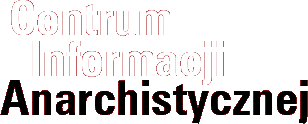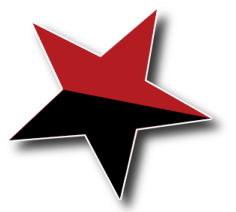Dyskutując z głuchymi: chavizm i anarchizm w Wenezueli
Artykuł opublikowany w piśmie „El Libertario” („Wolnościowiec”) - wydawanego w Caracas w Wenezueli od 1995 r.
Jako wydawcy pisma El Libertario odpowiadamy na typowe zarzuty topornej prawicy i rozwodnionej lewicy, która jest pod takim wrażeniem Chaveza, że w Wenezueli i zagranicą propaguje miraż Chaveza i jego pseudo-rewolucji. Chcielibyśmy wiele powiedzieć na ten temat, ale teraz ograniczymy się do zwięzłych informacji zawierających nasz punkt widzenia – choć powtarzaliśmy go już wiele razy.
Pytanie nr. 1: Hugo Chavez mówi o socjalizmie, władzy ludu i partycypacji. Czemu jesteśmy zawiedzeni, jeśli te ideały są zbieżne z anarchizmem?
Pretensje Chaveza są bardzo rozległe. Jednak on sam stwierdził, że powinniśmy bardziej przyglądać się temu co robi, nawet bardziej niż temu, co mówi. Z tego punktu widzenia, jego „socjalizm XXI” wieku jest jedynie zwykłym populizmem i państwowym kapitalizmem opartym na środkach z przemysłu naftowego. „Władza ludu” jest władzą elity rekrutowanej z wojska, międzynarodowych firm i „Boliwariańskiej burżuazji”. Wystarczy zdać sobie sprawę z niedawnego bezprecedensowego zwiększenia władzy prezydenckiej, czy konsternacji sojuszników Chaveza, gdy dowiedzieli się, co naczelny wódz rozumie przez partycypację. Anarchizm nie dopuszcza możliwości istnienia żadnego trwałego stanowiska obdarzonego władzą, a jedynie wciąż na nowo ratyfikowaną reprezentację w określonych działaniach określonych ludzi. To właśnie jest suwerenność i partycypacja, coś co nie jest obecne w istniejącym procesie władzy i żadnym innym opartym na hierarchicznej i permanentnej władzy Państwa.
Pytanie nr. 2: Oczywistą intencją rządu jest dokonanie pokojowej i demokratycznej rewolucji. Czemu więc nie poczekacie na rozwój sytuacji, zamiast ferować na jego temat opinie?
Chavez mówi o “rewolucji”, ale jego słowa nie wystarczają, żebyśmy w to uwierzyli i zaczęli go popierać. Zbyt wielu tyranów i demagogów na tym kontynencie mówił to samo bez jakiegokolwiek uzasadnienia. W naszym przypadku miała miejsce rewolucja w tym sensie, że nasze życie zostało na wiele sposobów rozmontowane, ale to co powstało w zamian w żadnym razie nie ma naszego poparcia. Pozwolić na konsolidację nowej sytuacji, to sprawić, że stanie się trudniejsza do zmiany, gdyż my chcemy zupełnie innych zmian niż te, które przyniosło 8 lat wodzostwa i autorytaryzm, biurokratyczna niewydolność, strukturalna korupcja oparta na wzorach i postawach, których nie możemy akceptować.
Pytanie nr. 3: Może rzeczywiście projekt władzy różni się od projektu wolnościowego, jednak chawizm dąży do konfrontacji z oligarchią i imperializmem. Czy nie byłby korzystne zawrzeć sojusz z Chavezem, a po zwyciężeniu oligarchicznych spiskowców i imperialistycznej agresji starać się dokonać anarchistycznej rewolucji?
Strategiczne sojusze służą do zdobywania władzy w państwie przez grupy sojuszników. Anarchiści dążą do zniszczenia państwa przy pomocy wszystkich. Porażka tzw. reakcji i oligarchii, to tylko puste słowa na użytek propagandy, które służą tylko konsolidacji władzy wygrywających i nieuchronnemu wytworzeniu kolejnej oligarchii. Taka jest logika kontroli państwa, która jest znana z ZSRR, Chin i Kuby. To jedynie utrudniłoby anarchistyczną rewolucję i Hiszpania 1936 jest tego dobrym przykładem. Określanie chawizmu jako walki ze spiskowcami jest ułomne, gdyż pierwszym celem ruchu było dokonanie zamachu stanu, a jego członkowie wciąż szczycą tym, że wywodzą się z subkultury koszarowej. Walka mniejszości oligarchicznej z rządem jest tylko walką jednej mniejszości przeciw innej mniejszości. Jeśli chodzi o walkę z imperializmem, wystarczy spojrzeć na politykę rządu w takich kluczowych sektorach jak nafta, górnictwo, rolnictwo, przemysł, prawo pracy, itd. Cała polityka rządu w tych dziedzinach zdaje się wspierać Imperium, a nie jego wrogów (więcej o tym na stronach El Libertario: www.nodo50.org/ellibertario).
Pytanie nr. 4: Rząd ogłosił dynamiczny rozwój lokalnych społeczności i zwiększenie władzy Rad Komunalnych, które są poziomym sposobem organizacji społeczeństwa. Czy anarchiści popierają takie oddolne struktury?
Zauważyliśmy, że utworzenie i funkcjonowanie Rad Komunalnych jest uzależnione od stopnia ich zależności od państwa. Są one zależne od władzy prezydenta, który według prawa musi udzielić im prawa do funkcjonowania. W Wenezueli jest wiele przykładów sytuacji, gdzie wiele organizacji oddolnych (wystarczy wspomnieć związki zawodowe) działa jak tramwaje otrzymujące prąd z góry. Nie znaczy to, że nie ma prób stworzenia prawdziwych organizacji oddolnych w społeczności lokalnej, wśród rolników, Indian, ekologów, studentów i artystów nawet wtedy, gdy nie ma na to zgody rządu. Uważamy jednak, że prawne, instytucjonalne i finansowe uzależnienie Rad Komunalnych od władz państwowych będzie stanowić poważną przeszkodę na drodze do uczynienia z nich autonomicznego oddolnego ruchu. To samo dotyczy zapowiedzianych Rad Pracowników w firmach, które mają najwyraźniej na celu zniszczenie niezależnych związków zawodowych.
Pytanie nr. 5: Dlaczego anarchiści krytykują Wenezuelskie Siły Zbrojne, które wyrastają z ludowej i narodowej gleby i nie postrzegają ich jako wsparcia dla projektu rewolucyjnego?
Większość nowoczesnych armii, od XVII i XVIII wieku w Europie do dnia dzisiejszego w Ameryce Łacińskiej, opiera się w większości na poborowych wywodzących się z ludu. Jednakże pomimo pochodzenia większości żołnierzy, powodem istnienia armii jest obrona struktury władzy i jej popleczników i dlatego armia nie może wspierać rewolucji na rzecz uciśnionych. Może nastąpi zmiana jednego figuranta na innego i zmienią się nieco reguły struktury władzy, ale sama zasada nie zostanie zmieniona, gdyż rozkazywanie i posłuszeństwo stanowią jej esencję. Z tego powodu nie wspieramy żadnej armii, żadnej policji i uprzywilejowanej osoby, która może używać przemocy i broni przeciwko innym ludziom. Nacjonalizm nie jest czymś, co wspierają anarchiści, gdyż nacjonalizm zakłada obronę interesów jednej grupy ludzi sztucznie otoczonych granicami terytorium państwowego, którzy uważają że są różni, a nawet lepsi od innych. Jesteśmy wrogami wszelkiego rodzaju uprzywilejowania z racji urodzenia, rasy, kultury, religii i miejsca urodzenia. Co więcej, tragiczna historia wojska wenezuelskiego mówi sama za siebie: powstało ono za rządów tyrana Gomeza, żeby zniszczyć federalistyczne aspiracje regionów. Armia utwierdziła się w swojej represywnej roli podczas walki przeciwko lewicowym powstańcom w latach 1960’tych i podczas masakry w 1989 r., której była wykonawcą.
Pytanie nr. 6: Czy anarchiści wenezuelscy są ‘chorzy’ (termin używany przez chawistów przeciwko wszystkim wrogom) i czy z tego powodu popierają socjaldemokrację i prawicową opozycję?
“Chorzy” to tylko terminem medialny, wykorzystywany jako obelga w celach politycznych i nie posiadający żadnego właściwego znaczenia. Ale jeśli to słowo ma oznaczać tych, którzy nie godzą się na oddanie wolności i autonomii i przyjęcie poddaństwa wobec osoby, partii, lub ideologii, to tak – jesteśmy chorzy. Jeżeli jednak tym słowem określa się zwolenników ideologii ekonomicznego liberalizmu, z ich quasi-rasistowskim potępieniem dla mniejszości, szwindlu demokracji przedstawicielskiej, czy powrotu form organizacji społeczno-politycznej z lamusa historii – to nie jesteśmy „chorzy”. Nie wspieramy Chaveza ani jego konkurentów w wyborach. Możemy się zgadzać z niektórymi działaniami podejmowanymi przez jednych lub drugich, z niektórymi ich wypowiedziami, ale dogłębnie krytykujemy większość ich działań i ich dyskursu. Nie zgadzamy się na nie kończącą się frustrację ludzi, którzy pokładali nadzieję w Chavezie, ale nie wspieramy demagogicznej taktyki oportunistycznego getta stanowiącego zinstytucjonalizowaną opozycję. A co najważniejsze, z powodu naszych zasad nie możemy popierać tych, którzy opierają swoje dążenia na podporządkowaniu ludzi hierarchii państwa – a to jest cechą zarówno obecnego rządu, jak i opozycji.
Pytanie nr. 7: Są ludzie, którzy uważają się za wolnościowych, ale wspierają proces zapoczątkowany przez Chaveza. Jeżeli uznamy ich za anarchistów, czyż nie byłby to argument na rzecz anty-dogmatycznego charakteru anarchizmu?
Anarchizm nie jest stanem duszy. To sposób reakcji na zmieniające się warunki społeczne i poszukiwanie dobrobytu dla każdego w kontekście dobrobytu dla wszystkich. To sposób formułowania propozycji, które pojawiają się u konkretnych ludzi, które są dyskutowane, przyjmowane lub odrzucane przez ludzi w określonym czasie i przestrzeni. Każdy może się nazwać anarchistą, ponieważ nie mamy identyfikatorów i rytuałów, by się wyróżnić. Jedynie nasz sposób wzajemnej interakcji i nasze idee nas wyróżniają i inni anarchiści mogą uznać nas za anarchistów lub nie na tej podstawie. Nie jesteśmy doskonali i dlatego możemy przyjąć poglądy, które ktoś może uznać za nie do zaakceptowania. Nie sprawia to, że stajemy się lepsi lub gorsi, ale czasem nasze idee stają się tak różne, że tracimy poczucie przynależności do jednego ruchu.
Pytanie nr. 8: Anarchiści jedynie gadają i nie uczestniczą. Jaka jest wasza propozycja pozytywnej zmiany współczesnej rzeczywistości Wenezueli?
Nasza walka nie jest kwestią sytuacji i okoliczności, ale nowego sposobu życia, które musimy przyjąć w życiu osobistym i kolektywnym. Sposobu, gdzie akcja bezpośrednia i samorządność pozwalają na kontrolę własnego życia, w sposób szczery i uczciwy, poprzez śledzenie jak pewne kwestie wiążą się z innymi, szanując równość wszystkich i występujące różnice. Nie sprawia to, że jesteśmy lepsi od reszty. Wiemy, że swoją egzystencję zawdzięczamy innym ludziom, których dobra musimy strzec, aby móc strzec własnego dobra. Nie możemy o tym zapominać, gdyż chcemy dobrze żyć. Każdy jest odpowiedzialny za swoje życie przed sobą i innymi, ale nikt nie może być pewien, że będziemy „zbawieni”. Dlatego nie ma gotowej recepty na określoną rzeczywistość społeczną, gdyż propozycje i działania idące w kierunku zmian muszą być owocem ciągłego i świadomego wysiłku grupy. Staramy się uczestniczyć na nasz wesoły sposób, promując odzyskanie autonomii ruchów społecznych w kraju, gdzie jak mamy nadzieję, będzie możliwe znalezienie miejsca dla rozwoju anarchistycznych idei wolności, równości i solidarności.
Kontakt do grupy (w jęz. hiszpańskim):
RAUL FIGUEIRA
Apartado Postal 128,
Carmelitas, Caracas,
VENEZUELA
ellibertario@nodo50.org
ellibertario@hotmail.com
Centro de Estudios Sociales Libertarios
Calle Blasina, esquina San Luis, Sarria, Caracas, Venezuela.
www.centrosocial.contrapoder.org.ve






